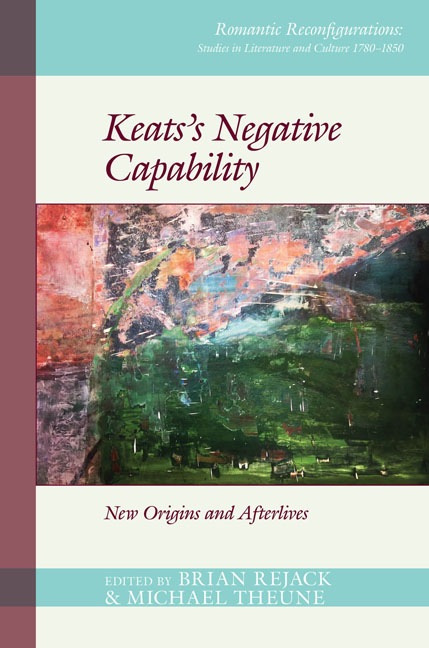Book contents
- Frontmatter
- Contents
- List of Figures
- Acknowledgments
- List of Abbreviations
- List of Contributors
- Preface
- Introduction: Disquisitions: Reading Negative Capability, 1817–2017
- Part I ‘swelling into reality’: New Contexts for Negative Capability
- Part II ‘examplified throughout’: Forms of Negatively Capable Reading
- Part III ‘pursued through Volumes’, Volume I: Negative Capability in Twentieth- and Twenty-First-Century American Poetry
- Part IV ‘pursued through Volumes’, Volume II: Adaptations, Appropriations, Mutations
- Afterword: Reading Keats's Negative Capability
- Bibliography
- Index
11 - ‘giddily off into the unknown’: Negative Capability and Naturalism in Elizabeth Bishop's Poetics
- Frontmatter
- Contents
- List of Figures
- Acknowledgments
- List of Abbreviations
- List of Contributors
- Preface
- Introduction: Disquisitions: Reading Negative Capability, 1817–2017
- Part I ‘swelling into reality’: New Contexts for Negative Capability
- Part II ‘examplified throughout’: Forms of Negatively Capable Reading
- Part III ‘pursued through Volumes’, Volume I: Negative Capability in Twentieth- and Twenty-First-Century American Poetry
- Part IV ‘pursued through Volumes’, Volume II: Adaptations, Appropriations, Mutations
- Afterword: Reading Keats's Negative Capability
- Bibliography
- Index
Summary
Art shews us nature, divested of the medium of our prejudices. It divides and decompounds objects into a thousand curious parts, which may be full of variety, beauty, and delicacy in themselves, though the object to which they belong may be disagreeable in its general appearance, or by association with other ideas.
When Elizabeth Bishop read ‘Lines Composed a Few Miles above Tintern Abbey’ in her 1963 copy of William Wordsworth's poetry, she jotted down an excited ‘Oh!?!’ upon underlining the words ‘Nature never did betray / The heart that loved her’. The marginal note seems to capture two different reactions, surprise and skepticism, while also gesturing toward that utterance's combination of spontaneity and reflection. In this sense Bishop's note calls to mind the epiphanic ‘oh!’ (line 36) of the speaker from ‘In the Waiting Room’, Bishop’s seven-year-old persona who suddenly conceptualizes her own presence in the world (while dutifully reading through National Geographic), and then just as quickly questions the truth of her awakening. In Wordsworth Bishop seems to have looked for a similar kind of self-mirroring, and, from Robert Pinsky to Charles Rzepka, many critics have thus explored the affinities between the two poets. When Pinsky suggests that Bishop writes ‘seemingly restrained, yet relaxed sentences, startlingly flexible in practice, … educated but not pedantic’, one remembers Wordsworth's endeavor ‘to bring [his] language near to the real language of men’. Both poets used plain language, both had a proclivity for the epiphanic. Both turned to the natural world for understanding and naturalized the characters they explored. Rzepka quotes Bishop's own statement: ‘I find I’m really a minor female Wordsworth—at least, I don't know anyone else who seems to be such a Nature Lover.’ Indeed, Bishop seems to have wanted to identify with how ‘Nature never did betray / The heart that loved her’; yet her approach is more that of a naturalist and comes much less from a stance of ‘the wordsworthian or egotistical sublime’ (LJK, I: p. 387). And though there is no record of Bishop's own discernment of her Keatsian tendencies, it may be worthwhile to revise her ties to the Romantics and rethink her love of nature not through Wordsworth but through Keats's negative capability.
- Type
- Chapter
- Information
- Keats's Negative CapabilityNew Origins and Afterlives, pp. 171 - 183Publisher: Liverpool University PressPrint publication year: 2019



